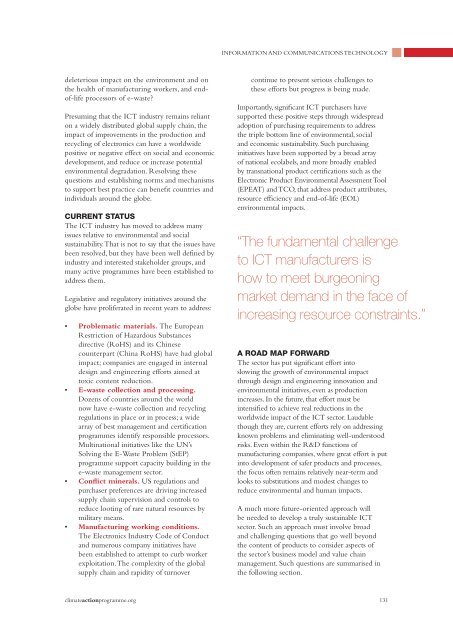Climate Action 2012-2013
Create successful ePaper yourself
Turn your PDF publications into a flip-book with our unique Google optimized e-Paper software.
INFORMATION AND COMMUNICATIONS TECHNOLOGY<br />
deleterious impact on the environment and on<br />
the health of manufacturing workers, and endof-life<br />
processors of e-waste?<br />
Presuming that the ICT industry remains reliant<br />
on a widely distributed global supply chain, the<br />
impact of improvements in the production and<br />
recycling of electronics can have a worldwide<br />
positive or negative effect on social and economic<br />
development, and reduce or increase potential<br />
environmental degradation. Resolving these<br />
questions and establishing norms and mechanisms<br />
to support best practice can benefit countries and<br />
individuals around the globe.<br />
CURRENT STATUS<br />
The ICT industry has moved to address many<br />
issues relative to environmental and social<br />
sustainability. That is not to say that the issues have<br />
been resolved, but they have been well defined by<br />
industry and interested stakeholder groups, and<br />
many active programmes have been established to<br />
address them.<br />
Legislative and regulatory initiatives around the<br />
globe have proliferated in recent years to address:<br />
<br />
<br />
<br />
<br />
Problematic materials. The European<br />
Restriction of Hazardous Substances<br />
directive (RoHS) and its Chinese<br />
counterpart (China RoHS) have had global<br />
impact; companies are engaged in internal<br />
design and engineering efforts aimed at<br />
toxic content reduction.<br />
E-waste collection and processing.<br />
Dozens of countries around the world<br />
now have e-waste collection and recycling<br />
regulations in place or in process; a wide<br />
array of best management and certification<br />
programmes identify responsible processors.<br />
Multinational initiatives like the UN’s<br />
Solving the E-Waste Problem (StEP)<br />
programme support capacity building in the<br />
e-waste management sector.<br />
Conflict minerals. US regulations and<br />
purchaser preferences are driving increased<br />
supply chain supervision and controls to<br />
reduce looting of rare natural resources by<br />
military means.<br />
Manufacturing working conditions.<br />
The Electronics Industry Code of Conduct<br />
and numerous company initiatives have<br />
been established to attempt to curb worker<br />
exploitation. The complexity of the global<br />
supply chain and rapidity of turnover<br />
continue to present serious challenges to<br />
these efforts but progress is being made.<br />
Importantly, significant ICT purchasers have<br />
supported these positive steps through widespread<br />
adoption of purchasing requirements to address<br />
the triple bottom line of environmental, social<br />
and economic sustainability. Such purchasing<br />
initiatives have been supported by a broad array<br />
of national ecolabels, and more broadly enabled<br />
by transnational product certifications such as the<br />
Electronic Product Environmental Assessment Tool<br />
(EPEAT) and TCO, that address product attributes,<br />
resource efficiency and end-of-life (EOL)<br />
environmental impacts.<br />
“The fundamental challenge<br />
to ICT manufacturers is<br />
how to meet burgeoning<br />
market demand in the face of<br />
increasing resource constraints.”<br />
A ROAD MAP FORWARD<br />
The sector has put significant effort into<br />
slowing the growth of environmental impact<br />
through design and engineering innovation and<br />
environmental initiatives, even as production<br />
increases. In the future, that effort must be<br />
intensified to achieve real reductions in the<br />
worldwide impact of the ICT sector. Laudable<br />
though they are, current efforts rely on addressing<br />
known problems and eliminating well-understood<br />
risks. Even within the R&D functions of<br />
manufacturing companies, where great effort is put<br />
into development of safer products and processes,<br />
the focus often remains relatively near-term and<br />
looks to substitutions and modest changes to<br />
reduce environmental and human impacts.<br />
A much more future-oriented approach will<br />
be needed to develop a truly sustainable ICT<br />
sector. Such an approach must involve broad<br />
and challenging questions that go well beyond<br />
the content of products to consider aspects of<br />
the sector’s business model and value chain<br />
management. Such questions are summarised in<br />
the following section.<br />
climateactionprogramme.org 131












